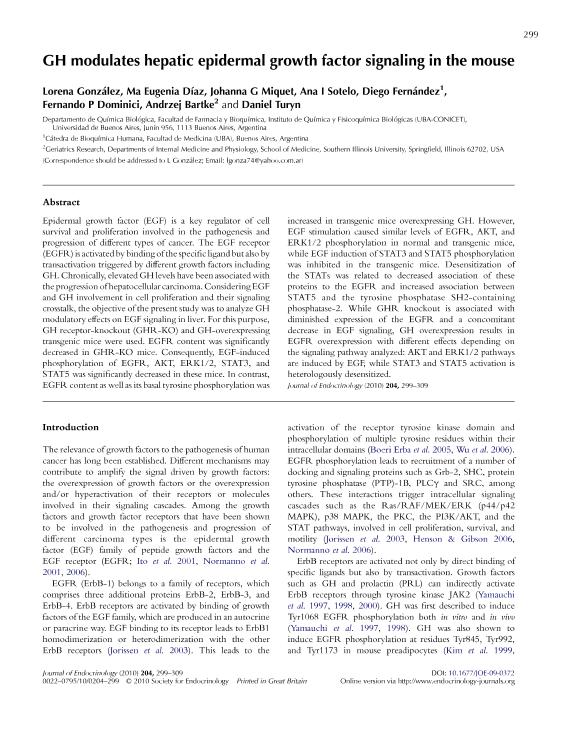Artículo
GH modulates hepatic epidermal growth factor signaling in the mouse.
Gonzalez, Lorena ; Díaz, María Eugenia
; Díaz, María Eugenia ; Miquet, Johanna Gabriela
; Miquet, Johanna Gabriela ; Sotelo, Ana Isabel
; Sotelo, Ana Isabel ; Fernandez, Diego Carlos
; Fernandez, Diego Carlos ; Dominici, Fernando Pablo
; Dominici, Fernando Pablo ; Bartke, Andrzej; Turyn, Daniel
; Bartke, Andrzej; Turyn, Daniel
 ; Díaz, María Eugenia
; Díaz, María Eugenia ; Miquet, Johanna Gabriela
; Miquet, Johanna Gabriela ; Sotelo, Ana Isabel
; Sotelo, Ana Isabel ; Fernandez, Diego Carlos
; Fernandez, Diego Carlos ; Dominici, Fernando Pablo
; Dominici, Fernando Pablo ; Bartke, Andrzej; Turyn, Daniel
; Bartke, Andrzej; Turyn, Daniel
Fecha de publicación:
03/2010
Editorial:
BioScientifica
Revista:
Journal of Endocrinology
ISSN:
0022-0795
Idioma:
Inglés
Tipo de recurso:
Artículo publicado
Clasificación temática:
Resumen
Epidermal growth factor (EGF) is a key regulator of cell survival and proliferation involved in the pathogenesis and progression of different types of cancer. The EGF receptor (EGFR) is activated by binding of the specific ligand but also by transactivation triggered by different growth factors including GH. Chronically, elevated GH levels have been associated with the progression of hepatocellular carcinoma. Considering EGF and GH involvement in cell proliferation and their signaling crosstalk, the objective of the present study was to analyze GH modulatory effects on EGF signaling in liver. For this purpose, GH receptor-knockout (GHR-KO) and GH-overexpressing transgenic mice were used. EGFR content was significantly decreased in GHR-KO mice. Consequently, EGF-induced phosphorylation of EGFR, AKT, ERK1/2, STAT3, and STAT5 was significantly decreased in these mice. In contrast, EGFR content as well as its basal tyrosine phosphorylation was increased in transgenic mice overexpressing GH. However, EGF stimulation caused similar levels of EGFR, AKT, and ERK1/2 phosphorylation in normal and transgenic mice, while EGF induction of STAT3 and STAT5 phosphorylation was inhibited in the transgenic mice. Desensitization of the STATs was related to decreased association of these proteins to the EGFR and increased association between STAT5 and the tyrosine phosphatase SH2-containing phosphatase-2. While GHR knockout is associated with diminished expression of the EGFR and a concomitant decrease in EGF signaling, GH overexpression results in EGFR overexpression with different effects depending on the signaling pathway analyzed: AKT and ERK1/2 pathways are induced by EGF, while STAT3 and STAT5 activation is heterologously desensitized.
Archivos asociados
Licencia
Identificadores
Colecciones
Articulos(CEFYBO)
Articulos de CENTRO DE ESTUDIOS FARMACOLOGICOS Y BOTANICOS
Articulos de CENTRO DE ESTUDIOS FARMACOLOGICOS Y BOTANICOS
Articulos(IQUIFIB)
Articulos de INST.DE QUIMICA Y FISICO-QUIMICA BIOLOGICAS "PROF. ALEJANDRO C. PALADINI"
Articulos de INST.DE QUIMICA Y FISICO-QUIMICA BIOLOGICAS "PROF. ALEJANDRO C. PALADINI"
Citación
Gonzalez, Lorena; Díaz, María Eugenia; Miquet, Johanna Gabriela; Sotelo, Ana Isabel; Fernandez, Diego Carlos; et al.; GH modulates hepatic epidermal growth factor signaling in the mouse.; BioScientifica; Journal of Endocrinology; 204; 3; 3-2010; 299-309
Compartir
Altmétricas



